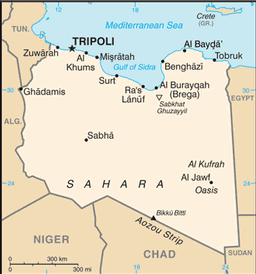NATO’s Secretary General has said the alliance will confirm on Friday a decision to end its operations in Libya by October 31. In tandem, the United Nations Security Council voted unanimously on Thursday to end military operations in Libya.
 These decisions conflict with what Libyan National Transitional Council (NTC) chairman Mustafa Abdul Jalil had requested earlier this week, that NATO continue its bombing campaign over the nation through at least the end of December and to add “military advisers” on the ground.
These decisions conflict with what Libyan National Transitional Council (NTC) chairman Mustafa Abdul Jalil had requested earlier this week, that NATO continue its bombing campaign over the nation through at least the end of December and to add “military advisers” on the ground.
While the request implied that the NTC still needed help cracking down on the pro-Gadhafi resistance, Jalil is probably more interested for NATO’s help in establishing authority within the NTC and its various factions throughout the country. The group is increasingly splintered and many are predicting tensions could escalate a new civil war between the Gadhafi defectors and the Islamist rebels within the NTC.
Despite the apparent finality in these decisions, NATO’s Secretary General Anders Fogh Rasmussen did provide a caveat, insisting that while he does not “foresee a major NATO role in Libya in the post-conflict period,” if it is formally requested the alliance could “assist” the new Libyan government, particularly in the areas of defense and security.
And the Western powers so eager to intervene back in March, just may find new cause to intervene again. The NTC forces US-NATO brought to power in Libya continue to be accused of widespread human rights, including a recent massacre of 53 pro-Gadhafi detainees by summary execution and over 7,000 prisoners of war in poor conditions and who have yet to be charged.
In addition, vast amounts of unsecured explosive weapons, including surface-to-air missiles, remain unguarded in areas around Libya and the NTC has failed to secure enormous weapons stockpiles despite months of calls by Western leaders and human rights organizations to do so. Weapons from Libya already seeped into the black market all around the region and failure to secure them domestically could precipitate tribal conflict.
In an attempt to calm these fears, the NTC has vowed to bring Moammar Gadhafi’s killers to justice, in a sharp break with their previous statements denying he had been brutally beaten and intentionally executed by his captors. Positions like this one and others promising a dedication to equality and the rule of law accelerated since Gadhafi’s death.
But many are still doubting that the post-Gadhafi Libya will be based on democracy and human rights, and since the US and NATO have injected their own responsibility into the future of Libya, continued intervention is to be expected.


